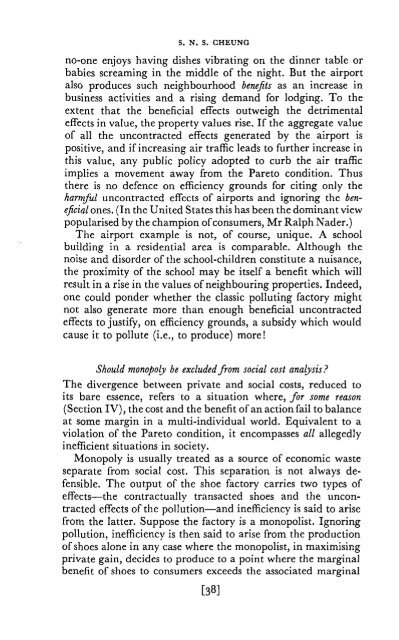THE MYTH OF SOCIAL COST.pdf - Institute of Economic Affairs
THE MYTH OF SOCIAL COST.pdf - Institute of Economic Affairs
THE MYTH OF SOCIAL COST.pdf - Institute of Economic Affairs
You also want an ePaper? Increase the reach of your titles
YUMPU automatically turns print PDFs into web optimized ePapers that Google loves.
S. N. S. CHEUNG<br />
no-one enjoys having dishes vibrating on the dinner table or<br />
babies screaming in the middle <strong>of</strong> the night. But the airport<br />
also produces such neighbourhood benefits as an increase in<br />
business activities and a rising demand for lodging. To the<br />
extent that the beneficial effects outweigh the detrimental<br />
effects in value, the property values rise. If the aggregate value<br />
<strong>of</strong> all the uncontracted effects generated by the airport is<br />
positive, and if increasing air traffic leads to further increase in<br />
this value, any public policy adopted to curb the air traffic<br />
implies a movement away from the Pareto condition. Thus<br />
there is no defence on efficiency grounds for citing only the<br />
harmful uncontracted effects <strong>of</strong> airports and ignoring the beneficial<br />
ones. (In the United States this has been the dominant view<br />
popularised by the champion <strong>of</strong> consumers, Mr Ralph Nader.)<br />
The airport example is not, <strong>of</strong> course, unique. A school<br />
building in a residential area is comparable. Although the<br />
noise and disorder <strong>of</strong> the school-children constitute a nuisance,<br />
the proximity <strong>of</strong> the school may be itself a benefit which will<br />
result in a rise in the values <strong>of</strong> neighbouring properties. Indeed,<br />
one could ponder whether the classic polluting factory might<br />
not also generate more than enough beneficial uncontracted<br />
effects to justify, on efficiency grounds, a subsidy which would<br />
cause it to pollute (i.e., to produce) more!<br />
Should monopoly be excluded from social cost analysis?<br />
The divergence between private and social costs, reduced to<br />
its bare essence, refers to a situation where, for some reason<br />
(Section IV), the cost and the benefit <strong>of</strong> an action fail to balance<br />
at some margin in a multi-individual world. Equivalent to a<br />
violation <strong>of</strong> the Pareto condition, it encompasses all allegedly<br />
inefficient situations in society.<br />
Monopoly is usually treated as a source <strong>of</strong> economic waste<br />
separate from social cost. This separation is not always defensible.<br />
The output <strong>of</strong> the shoe factory carries two types <strong>of</strong><br />
effects—the contractually transacted shoes and the uncontracted<br />
effects <strong>of</strong>the pollution—and inefficiency is said to arise<br />
from the latter. Suppose the factory is a monopolist. Ignoring<br />
pollution, inefficiency is then said to arise from the production<br />
<strong>of</strong> shoes alone in any case where the monopolist, in maximising<br />
private gain, decides to produce to a point where the marginal<br />
benefit <strong>of</strong> shoes to consumers exceeds the associated marginal<br />
[38]












